Q&A with Konstantin Monastyrsky
This page represents the amalgamation of actual questions that I am frequently asked via e-mails, during lectures, book signings, etc.
Q. Konstantin, how old are you and your wife?
Q. How do you feel? How's your health?
Q. Where do you buy your food?
Q. Do you buy/eat only organic food?
Q. Why are you so passionate about children's health?
Q. Why didn't you become a doctor?
Q. You could have become a great doctor. Do you want to become one now?
Q. Are you the author of those caricatures?
Q. Are your books as personal as this site?
Q. How did you learn to write so well considering that English is your second language?
Q. Konstantin, how old are you and your wife?
I am 70 years old. Tatyana is just three months yonger, and she doesn't hide her age. As you can judge from her picture on the left, why should she? I took this photo on November 3, 2024, three months short of her 70th birthday, and it's only adjusted for color.
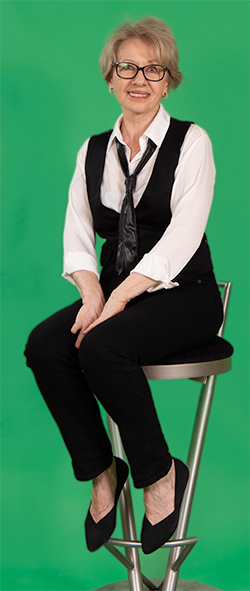 We have eaten the same foods and have taken similar supplements ever since we switched to functional nutrition in 1996. Tatyana looks and feels today just as well as when we married in 1994. And she has never stepped into a gym. A few years ago, we purchased an elliptical exerciser, which she uses on and off for 10-15 minutes a day, and no plastic surgeries of any kind.
We have eaten the same foods and have taken similar supplements ever since we switched to functional nutrition in 1996. Tatyana looks and feels today just as well as when we married in 1994. And she has never stepped into a gym. A few years ago, we purchased an elliptical exerciser, which she uses on and off for 10-15 minutes a day, and no plastic surgeries of any kind.
We both realize that Tatyana is a walking billboard for my work. But we refrain from exploiting her good looks and good fortune for the same reason I keep my own story out of my books — one person's health history and aging experience aren't representative of another's.
Nothing is surprising about this—look at Hollywood's glamour set. Many stars — at least the smart ones — age well because they preserve their bodies with the same attention and vigor that others use to preserve their car's underbody, their lawn, or their carpet.
From what I've learned from our journey with Tatyana, you need the luck to become a movie star — but you only need performance and longevity nutrition know-how to look and age like one!
That's what I meant by once challenging visitors to this site with the opening question: Why do some people keep living while others keep dying? Because 'some' don't live by luck alone, that's why!
Q. How do you feel? How's your health?
Most people automatically presume that you should be a paragon of health and vitality if you write about health and diets. And if you aren't—you are a cheat. I agree with this "talk the talk, walk the walk" thinking 100%.
That said, I didn't start writing about health and nutrition from a brand new or even slightly used slate. I did so when I was just a few steps away from a graveyard. Most of those problems, thank God, are gone. But, of course, all of them left their irreversible imprints, however hidden or well-burnished. So while I am in excellent health and shape vis-à-vis most men my age, only God knows what the future has in store for me. So, at this point, it's all a matter of luck.
Since I firmly belong to the "the harder you work, the luckier you get" school of thought. Hence I work harder to attract all the good luck I can get. It also means consuming a functional diet; enjoying restrained drinking; exercising regularly; devoting time to quality sleep; taking professional-grade supplements; having a loving family; not using prescription drugs; being happy with what you have; forgetting old grievances and not creating new ones; wearing seat belts and observing traffic rules; doing the work you love and getting paid for it well; sharing my knowledge with anyone willing to listen; and praying to God for love, health, and forgiveness.
You'll find an even longer answer to this question in this essay wrote a year shy of my seventies birthday: Why Should You Follow My Example? It also include my most recent photo.
Q. Do you have children?
No, we don't. We married in 1994 when we were both 40. We haven't done anything not to have kids. They just haven't happened on their own. With what I know now, it's not surprising — in those years, we were in okay enough shape to enjoy attempts at child-making but were no longer fit enough for unassisted conception.
In the last several years, I've been quite shocked to hear more than one story from ladies in their mid-40s who followed my recommendations for several years and got accidentally pregnant because they abandoned contraceptives years ago. In one case, the husband was in his late sixties, also my ardent follower. Still, those 'accidents' are considered anecdotal evidence and may not represent other couples.
Even this benefit turns some people off. One of our Russian acquaintances, learning about this probability, looked wistfully at his beautiful wife and remarked sarcastically: "You mean to say if we'll get to live to one hundred, I'll have to make love to my babushka?" The 'babushka' in this context is a Russian word for an old, withered woman. He grimaced and added with pain: "Oh, no!..."
Q. What do you eat at home?
What I eat is what's right for me — a 70-year-old male of Jewish ancestry with a prior history of food allergies, digestive disorders, type 2 diabetes, obesity, and, at present, a somewhat laid-back lifestyle related to my occupation as a medical writer.
For these reasons, my daily diet is relatively meager and austere, at least by conventional standards. I also take a handful of quality supplements to compensate for not consuming fortified foods and avoiding fresh fruits, vegetables, and juices loaded with carbohydrates, fiber, and allergens.
Thus, what I eat may be entirely inappropriate for you because of your age, health history, weight, ancestry, and many other factors that make the two of us so different. Besides, very few people take e professional-grade supplements regularly, so following in my footsteps may quickly lead you to undernutrition.
Also, responding to this question is a thankless endeavor because, inevitably, most people will end up interpreting my answer for themselves: "Oh, I can't eat like that;" or "Oh, it's too little for me;" or "Oh, it's too much for me," and so on.
If you are still not satisfied with my response, reading this page — The Ingredients of Longevity Nutrition — will give you a good overview of the key principles behind my diet. I also allude to what I eat in some detail in the last two chapters of Fiber Menace.
I‘ve only made one change since completing that book and launching this site — I no longer consume alcoholic beverages with most dinners because they started to affect my sleep, weight, and mood. This, in turn, started to impact my credibility (from not looking the part), productivity (from lousy sleep), and quality of life (from both of the above) in more ways than one, so giving up a glass or two of wine or sake with dinner wasn't such a big deal, at least for me. As hard as I try, I often break this rule when eating out, taking vacations, having a festive dinner at home, and on weekends.
Finally, if you study this site, you have very likely damaged your health and digestion after reading one of those "repeat after me" books or blogs dedicated to diet and nutrition. So I am not about to cause you even more harm promoting my dietary preferences. If anything, I am not a zealot (or a fool).
Q. Do you eat out often?
Eating out without overeating is a considerable challenge. It's also next to impossible to dine out in most restaurants, mainly ethnic, without ingesting MSG, gluten, excess sodium, soluble fibers, or some other junk.
Tatyana and I are so 'clean' on the inside, and for so long, we acutely feel additives that are routinely added to restaurant foods. It isn't just MSG, but also countless commercial sauces and spices that may contain highly allergenic ingredients.
Some people, who are accustomed to taste and appetite enhancers, may not notice them. But when one does, it means unwelcomed anxiety, sleeplessness, migraine headaches, and so on. No good either.
Tatyana loves sashimi. To get excellent sashimi, we have to drive down to Manhattan. It's time-consuming and expensive, so we don't do it often.
Q. Where do you buy your food?
Our food shopping is more like foraging. We drive around half of Northern New Jersey to gather our usual staples.
We procure Australian lamb at Costco; fresh-caught fish and vegetables at a Korean supermarket in Little Ferry or Fort Lee (H-Mart); ground beef, lamb necks (for stew), organic coffee, organic rice, rice pasta, and cat food at Whole Foods in Paramus; home-made pickles and Alpine butter at a Russian market in Paramus; authentic Prosciutto De Parma and half-decent mozzarella at Market Basket in Franklin Lakes, and so on. With a tiny bit of effort, you too can find similar or better foods almost anywhere.
We rely on local supermarkets for heavy cream, toiletries, organic eggs, natural sour cream, and French or Italian table wines for Tatyana and guests — unlike vintage wines or domestic fare, table wines from Europe are practically sulfites-free, and don't cause headaches “the morning after.”
Q. Do you buy only organic food?
Yes, we prefer organic but aren't paranoid about it for several reasons. First, we don't eat fresh fruits and buy a few vegetables—mainly hydroponic tomatoes and cucumbers. Hothouse veggies aren't exposed to herbicides, pesticides, and fertilizers as much as are conventional ones. In fact, they may be 'cleaner' than 'organic' varieties from open fields because they also don't get exposed to acid rain, air pollution, and residual soil contamination from the pre-organic era.
Second, we buy mainly imported (Australian, New Zealand, or Icelandic) beef and lamb. These meats come from free-range grazing animals, so they‘re as wholesome as domestic organic meats—and much tastier.
Costco is an excellent source for Australian lamb, and our local ShopRite often has superb Australian free-range beef. We buy only organic eggs, chicken, and occasional ground beef at Whole Foods—or the local supermarket, which resembles Whole Foods more and more.
Q. How do you feed your cats?
We adopted two strays in 1999. Dusik (a Russian diminutive for soulful) and Nosik (a diminutive for the "nose") are fraternal twins. They were born in our backyard, and we took over after their mother-cat left them to fend for themselves.
Despite our 'dog' lover background, which included a healthy contempt for cats, it was love at first sight, and has been growing ever since. Michael Reagan, a son of the late President Reagan, once remarked that cats are like children but don't need tuition. If we ever develop deep wrinkles, they will be from smiling all the time when our cats are close by.
After we brought Dusik and Nosik home, we fed them dry premium food on the vet's advice—a significant source of fiber. Shortly after that, I noticed that their stools were unusually large relative to their tiny bodies and that they strained long and hard. Also, they were drinking non-stop and urinating profusely.
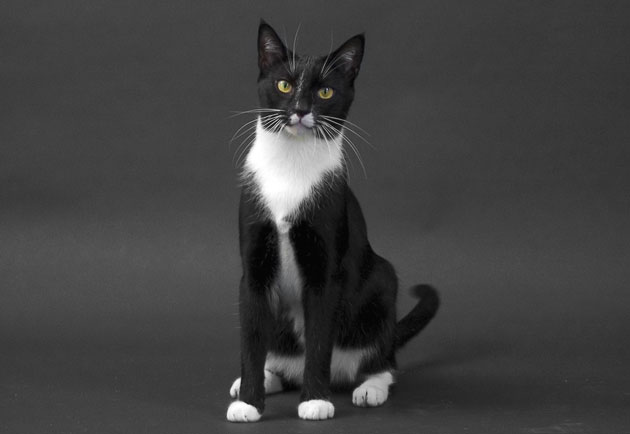
Dusik (1999 - 2018)
Following an urgent 'concilium' with Tatyana, we concluded that cats in nature feast exclusively on birds, rodents, and occasional fresh grasses. No dry food in nature. No processed fiber. So no more dry food in our house.
We then experimented with different types of organic canned food. Soon we found the ones they liked the most (PetGuard) and phased out the dry food. Their stools normalized, and they stopped straining, drinking, and urinating excessively.
We give them raw minced beef or organic liver every other day. They don't like fish and don't express any interest in our food. Dusik weighs 10 lb, Nosik—13 lb. Their weight hadn't changed since 2000 when they were fully grown.
Ideally, cats this age should eat only once a day. Ours eat twice, about 3 oz each in the morning and the evening. They are creatures of habit, and we don't have the nerve to stop that pleasure for them.
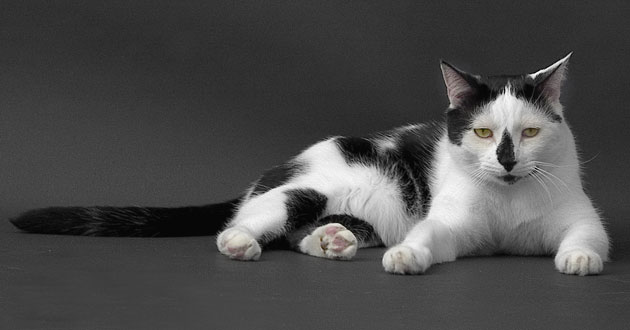
Nosik (1999 - 2015)
We regularly add a drop of cod liver oil and acidophilus from our capsules into their food. Before raw meat (a source of iron), they were also getting iron supplements once a week after noticing Dusik licking a cast-iron skillet intensely. We also grow fresh wheatgrass year around and, occasionally, 'dope' them with catnip (if you don't have a cat, that's a cat's version of the pot, only legal). Nosik loves to get high, but Dusik doesn't care for it.
Nosik drinks water occasionally, but I've never seen Dusik drinking—he gets all his water with moist food. We used to buy Nosik Icelandic bottled water—his favorite, but he has developed a taste for S.Pellegrino in the last few years.
Finally, before we all go to bed, the 'kids' get a few drops of heavy cream mixed with water. That's our nightly ritual.
The last time they saw a doctor was when they were neutered in 1999. Since then, there has been no need. Our local animal shelter provides hassle-free vaccination.
I have read a lot about IBS, hemorrhoids, colitis, kidney failure, diabetes, arthritis, arrhythmia, fibromyalgia, and other “human” diseases that affect cats. That's not surprising — human-like nutrition yields human-like diseases and misery.
Despite the substantial fresh meat cost, zoos don't feed their wild cats (lions, leopards, jaguars, etc.) with dirt-cheap dry food. Veterinarians trained in wildlife medicine simply won't allow it. Besides, these cats are treasured acquisitions, so their handlers feed them accordingly. Probably better than themselves, that's for sure.
Q. Why are you so passionate about children's health?
If I weren't who I once was, I wouldn't have become who I am. My health was screwed up big time with 'healthy' nutrition. Growing up in a well-to-do family in the fifties and sixties, I had already been eating an abundant high-carb, high-fiber diet year-round.
For me, all that meant persistent migraines, depression, attention-deficit/hyperactivity disorders (AD/HD), somewhat stunted growth, countless cavities, hemorrhoids in my teens, unrelenting IBS in my twenties and thirties, and, finally, diabetes by 40.
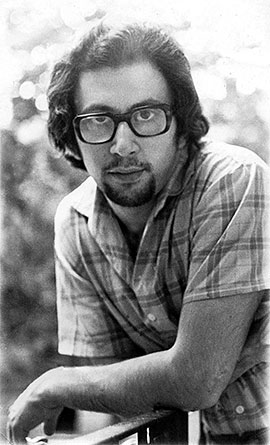
I was also exceptionally aggressive in my late teens, early twenties, even though I didn't have a build for that kind of behavior. You can probably sense that innate aggression from my self-portrait on the left that I took in 1977. During those times, I used to pick fights with guys twice my size and strength. I finally stopped when somebody hit me in the face with a brick—you can take only so many bricks head-on.
Now, of course, I realize the source of that rage. Just like the rest of AD/HD, it was an outcome of sky-high blood sugar (source of energy) and an elevated level of insulin (fight-or-flight response hormone, in my case — fight), two conditions typical of my diet. These two 'cancers' turn otherwise normal kids into little monsters who can't stop self-destructing until all that pent-up energy gets expended or pummeled down with downers.
Not surprisingly, when I got older, I found a 'perfect' antidote—cigarettes and alcohol. American kids are doping themselves instead to curb aggression or treat depression. Lucky ones get prescription drugs like Ritalin or Adderall. Disadvantaged kids get illicit drugs, like crack or pot. (I quit smoking cold turkey in 1984 on a bet.)
Same causes but a different approach to medication or self-medication. It's so much easier to remove sodas, cereals, juices, candies, and cookies from children's diets than to dope kids into submission with prescription meds or let them dope themselves. And it's cheaper than building more prisons and training more corrections officers. Drugs, prison—whatever way you do it, young lives are ruined for nothing. And, quite often, parents' lives are ruined too.
Back to your question: for every child, my work helps, God gives me credit. I need many credits to compensate for my upbringing and reverse the effects of latter-day damage. You can call it passion if you wish.
Q. Why didn't you become a doctor?
Ever since I remember, I have wanted to be a journalist, not a doctor. But in those years, journalistic colleges in the Soviet Union were off-limits for Jews. That rabid anti-Semitism and a dead-end future were the reasons why we emigrated to the United States.
When I enrolled in medical school (Lviv State Medical University, 1972), 1972), the M.D. track was six years, pharmaceutical track—just 4.5, which suited me much better. But dispensing pills all day long behind the counter wasn't exactly my life's calling. That's why, as soon as I recognized that, I decided to get into the high-tech field. The rest was pure luck, happenstance, fate, and lots of hard work—until I got hit by carpal tunnel syndrome and could no longer use the keyboard and mouse.
Even after five books, hundreds of articles, several websites, and gazillions of daily e-mails, my hands are OK. I have been banging on the keyboard 10-15 hours a day, almost every day, for the last 24 years. Not bad for someone who, two-and-a-half decades earlier, had to drive with his knees because of unbearable pain in both wrists.
I didn't do anything particular to 'treat' carpal tunnel syndrome. All my efforts have been addressed towards the recovery from diabetes. As soon as I was diabetes-free, all other complications, including carpal tunnel syndrome, gradually receded. That (the reversal of sugar diabetes) was the subject of my Russian-language book Reversing Metabolic Syndrome.
Q. You could have become a great doctor. Do you want to become one now?
I feel I wasn't born to be a doctor, but rather a rabbi or a priest. Unfortunately, I grew up in the wrong place and at the wrong time. Becoming a medical writer is the next best thing to being an ordained physician. Nowadays, more people beg for forgiveness in hospitals and medical offices than in the pews. Ultimately, I've got to write and deliver my sermons, which may also heal, improve, and enrich.
I admire and respect doctors. It's an incredibly tough (on call 24/7, witnessing so much suffering), risky (germs and all), and mostly thankless (patients die no matter how good you are) job.
Yes, doctors get paid well, but, as far as I am concerned, they deserve every penny of it considering the professional risks and investments (of time and money) they make into becoming one. But I really can't do it regardless of the pay and glory, even if there were no risks. Also, consider this:
— First, you don't need to be a doctor to become a good medical writer, just like a medical doctor doesn't have to be a writer to be a good doctor. (Medical education is a big plus for a writer, and I already have one.)
— Second, even the very best doctor can substantively help only a limited number of people on any given day. On the other hand, my books will eventually help millions.
— Third, if by "great doctor" you mean a physician who devotes inordinate amounts of time to each patient, makes sure they get well, and ensures they never return for more tests, more checkups, and more drugs—in today's business environment, that's a certain prescription for Chapter 11, just as described in this article by The New York Times: Many Doctors, Many Tests, No Rhyme or Reason. So I may sometimes come across as naïve and altruistic, but I am certainly not stupid or munificent at my family's expense.
— Finally, there is a substantial difference between what medical writers and medical doctors do. I strive to teach my readers not to get sick. Doctors get confronted with sick patients and work hard to save their lives. That's a tough and honorable job—but, ultimately, not the one I can do or would like to do.
Q. Are you the author of those caricatures?
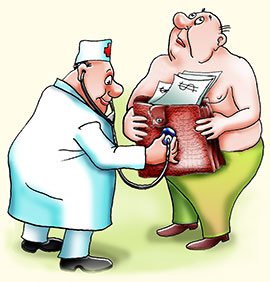 I wish. I sketch them in words, sometimes in pen, and pass those descriptions over to a genius and genuinely good human being named Eugene Kran. His sharp eye and unflinching brush give them their character and gusto.
I wish. I sketch them in words, sometimes in pen, and pass those descriptions over to a genius and genuinely good human being named Eugene Kran. His sharp eye and unflinching brush give them their character and gusto.
Eugene is a professional illustrator based in Tumen, Russia, and I am honored to have his illustrations in my Russian-language books and on this site. They make these depressing pages less somber. They are hilariously funny. If laughter is the best medicine, then they are our gift to you.
Interestingly, Eugene's wife — Dr. Svetlana Lapik, Ph.D., M.D., is a Professor of Medicine and the Dean of The Nursing Department at the Tumen's Medical Academy. This "up close and personal" connection explains Eugene's uncanny insights into his jovial cartoons' characters and why they are so deliciously alive.
After reading both of my Russian-language books (that he so lovingly illustrated), and despite his mother-in-law's concerns, who is a retired physician, Eugene wholeheartedly embraced the concept of functional nutrition described there. This change has helped him overcome severe hypoglycemia that has plagued him since childhood and reenergized his career. He is now one of the most recognized and prolific cartoonists in Russia. Not surprisingly, his mother-in-law has turned into a “believer,” especially when it applies to the family cat!
Q. Are your books as personal as this site?
A lawyer who represents himself has a fool for a client. A medical writer who writes about and 'around' himself has a fool for a reader! For this reason, my books are factual, not biographical. You can easily recognize this from perusing the chapters on this site.
In the last three chapters of Fiber Menace, I briefly mention myself, which deals with recovery from fiber addiction and transition to low-fiber nutrition. I learned the perils of transition first-hand, survived them, and helped many people do the same. That kind of experience is priceless. Otherwise, I keep myself out of my books because my travails and biases are anecdotal and unrepresentative for people of different ages, genders, backgrounds, and health histories.
Dr. Ornish is a prominent example of the “do onto others what you've done onto yourself” school of medical writing. He happens to be a professor of medicine at the University of California, San Francisco — a place perfectly suitable for year-round long-distance running.
An upper-class, middle-aged, healthy, and athletic intellectual living in California can indeed load himself to the gills with fruits and grains all day long, because he can burn off all of the over-consumed energy by pumping iron and running around gorgeous, sunny grounds under the gaze of an admiring faculty and students.
Try to imitate that feat year-round in Maine, Minnesota, or even New Jersey, particularly before or after your full-time day job. Factor in rambling traffic, insidious pollution, constant noise, inclement weather, unwelcoming surroundings, and, often, no sidewalks.
Not surprisingly, most of those people who heed Dr. Ornish's advice aren't remotely close to living his upscale lifestyle. Nonetheless, they load themselves with dirt-cheap carbs just as diligently—but instead of becoming fit, trim, and famous, they end up fat, miserable, and diabetic. And some direct their pent-up energy into road rage, drinking, or drugs instead of teaching, writing, and running.
Not surprisingly, most "repeat after me" health books come from California, Florida, or Hawaii. Since I am still stuck in Northern New Jersey, no, my books aren't personal.
Q. Do you exercise?
I stretch out each morning to keep my spine supple, and, weather permitting, walk briskly for several miles outside. On bad days I pedal the elliptical or run on the treadmill for a similar distance inside.
Also, from mid-spring until mid-autumn, while it is still relatively warm on our screened porch, I play high-speed table tennis against a robot. Each workout lasts for about 40-45 minutes, and I try to do it almost every evening.
Two years ago, I started working out with a trainer several times a week. At first, I was anxious regarding my ability to sustain the aftereffects of intense training, but after a brief while my body adjusted better than I was expecting.
Luckily, my stress resistance is exceptionally high. But since I've started exercising this way, it's gotten even higher. So it's definitely worth the time, money, and effort to keep this program going.
Like most post-collegiate-age emigrants from the continent, and with zero parenting experience, I am disfranchised from all American sports, which saves me lots of time for work and other fun pursuits.
Q. How did you learn to write so well, considering that English is your second language?
Writing is part gift, part hard labor. In my case, the ratio is one part gift, ten parts — hard labor. I go over my texts over and over until they feel just right. Then, I let it rest, rewrite, rest, and again and again until I am 95% happy. Trying to go after the last 5% means failure and depression, so I let it go.
Many people are surprised to learn that writing in the Russian language — my native tongue — is more difficult for me than in English. The reasons behind this 'anomaly' are relatively prosaic. Russian hasn't been my "working language" since 1978, which means the following: I don't read much anything in Russian; I am behind the curve on language development; all of my background research in English, and it needs to be translated; and I don't have as good on-line references, thesaurus, and dictionaries in Russian as in English — a must for a writer.
Technical merits aside, I also don't particularly enjoy writing in Russian. The motivation isn't there because the pool of prospective readers and commercial success potential is much smaller. Professional writers have to think about these mercantile things for the same reasons non-writers seek job security, advancements, and pay raises.
On top of all of the above, Russian is more demanding than English to write because it usually takes twice as many words to express a similar thought or concept. That lack of brevity drives me nuts because I adore the laconic specificity of my beloved English.
People often ask me about Nabokov's extraordinary English, which makes me laugh. English, not Russian, was Nabokov's first language. His wealthy parents detested Russian — a peasant's language for them — and he hadn't heard a word of Russian until he was five years old. I hadn't heard much English until I was 24!
Finally, I think in English, so writing in Russian is like translating my thoughts in real-time, and this takes twice as much energy to the point of causing an occasional headache.
Spoken language is a different story. Although my spoken English is head-and-shoulders more expressive than my Russian, I am less self-conscious while speaking Russian. Interestingly, when I speak publicly, I lose that self-consciousness, and my English-language facilities dramatically improve. But small talk is often a problem. Probably, for this reason, many people take me for a dunce!
Oh, well, this is the story of my life regardless of the language. It probably, explains why I became a writer — the audience, even an imaginary one, charges me up to the point of getting a "high." From all other possible ways of getting high, medical writing is probably one of the healthiest, safest, and least expensive. And if one gets lucky, it also pays well. Not as well as writing about Harry Potter, but after the first billion, who cares. I am just kidding!
Q. Your book/site really helped me. How can I tell others about it?
Thank you. Please post your review on Amazon, your blog, or your social network page. C.C. it to your friends and colleagues via e-mail. Post it on your company's bulletin board. Send a note about it to your local radio or TV station. This way, your account will find a much larger audience. Please, don't forget to include a link to this site.
Of course, I realize that my work is polarizing and that some people may hate the messenger (of bad news). Others have a vested interest in hating me, and some are attention-seeking nuts. But there is little I can do about it — if you place your book on Amazon and open your site to all, you take it all as well, good and bad.
Fortunately, there are always more positive comments than negative ones, so I am blessed.
